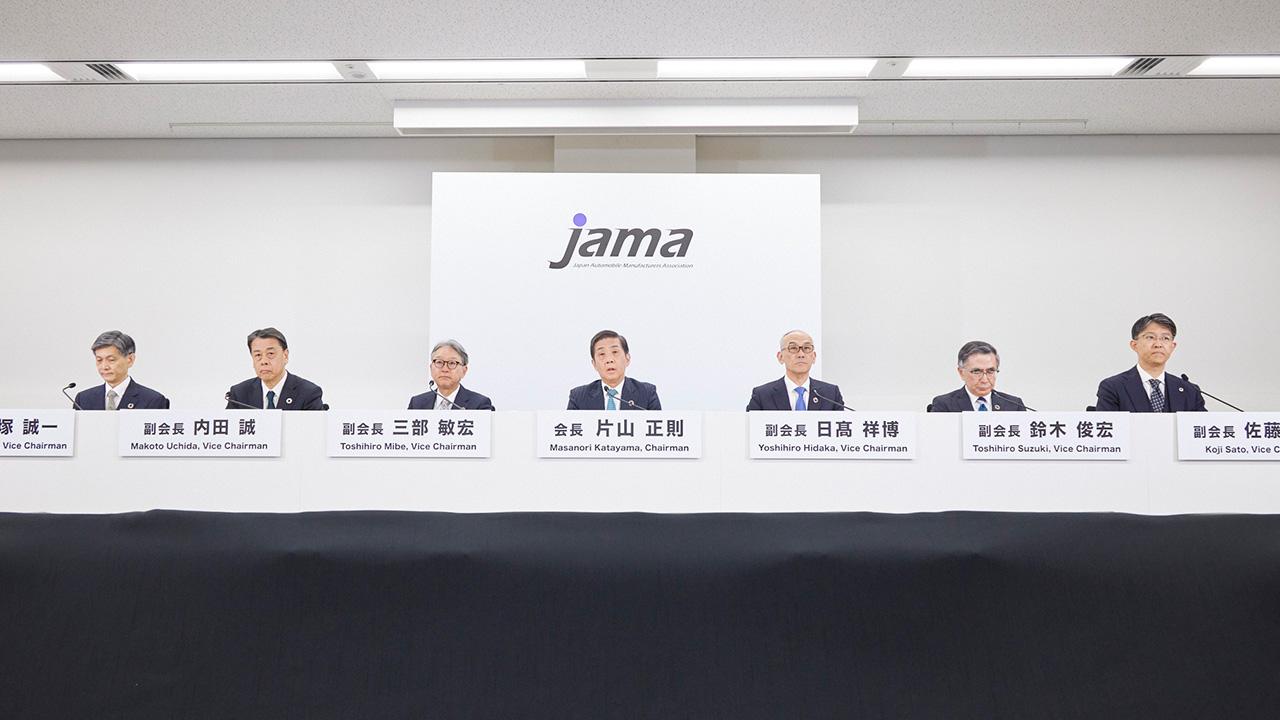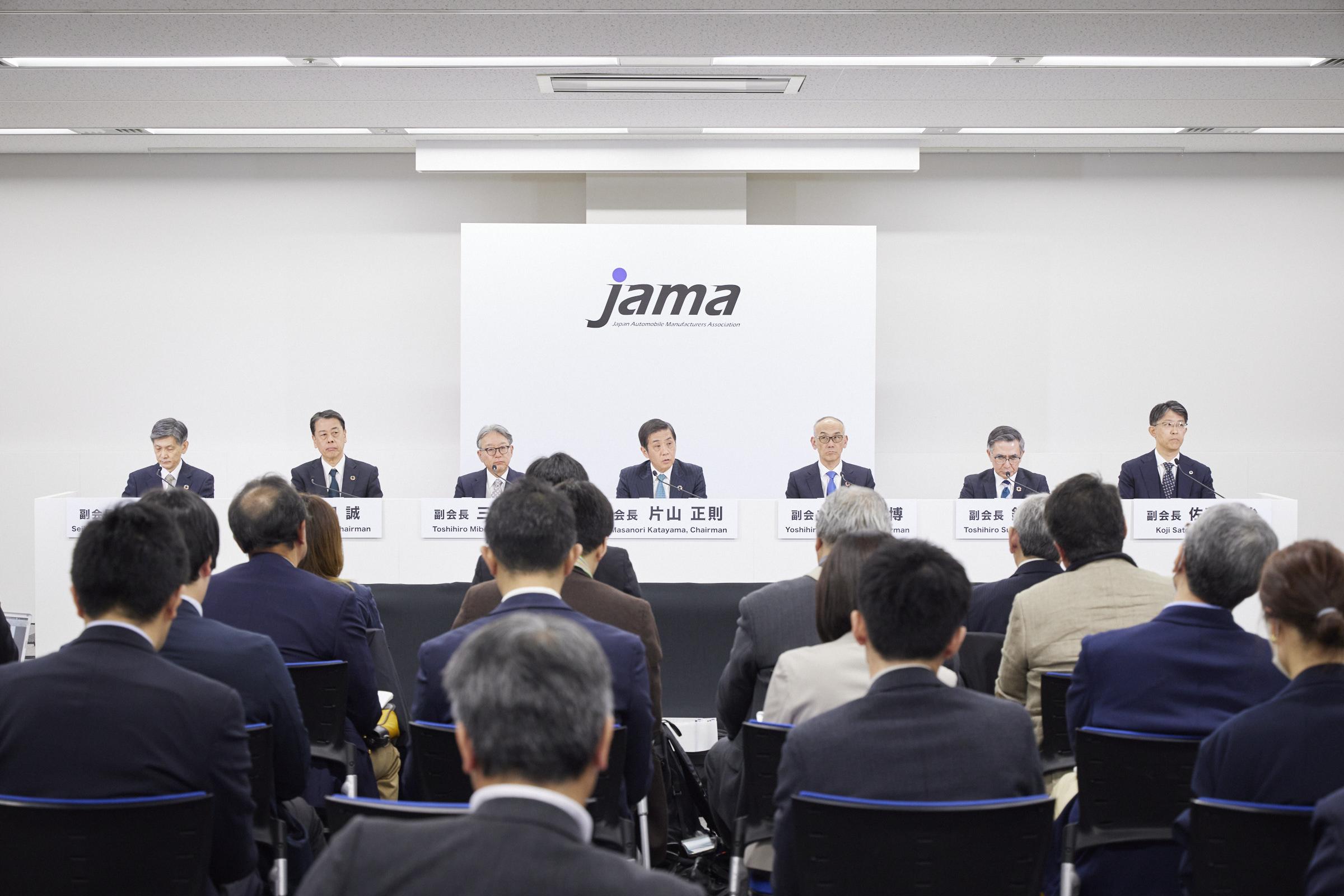
JAMA's chairman and vice chairmen have taken responsibility for tackling seven challenges confronting the auto industry. At a recent press conference, they spoke about their industry-spanning initiatives.
Public and private sectors working together
The session then moved on to Q&A. One reporter asked how JAMA, under its new leadership, plans to coordinate efforts with the national government.
Chairman Katayama
We will be in close collaboration, chiefly with the Ministry of Economy, Trade and Industry and the Ministry of the Environment.
The previous leadership team created a framework of mobility dialogues with Prime Minister Fumio Kishida. These discussions revolved around establishing a future mobility society, which is closely related to the seven issues we are currently addressing. We want to align ourselves squarely with the government’s long-term vision. In essence, the rails have already been laid, and we want to proceed on that track.
Next, Vice Chairman Uchida responded to a question about specific initiatives to address issue two, infrastructure development for the proliferation of electric vehicles.
Vice Chairman Uchida
I think concern over charging infrastructure remains one of the reasons people are not purchasing EVs.
On this point, various programs have been set up for new housing complexes, for example. If we look at existing ones, however, around 40% of people in Japan live in such complexes—rising to roughly 70% in Tokyo—and only 0.06% of these have charging facilities installed.
We have set three priority areas: creating systems to ease the burden of installing charging facilities (in housing complexes), reducing upkeep costs, and installing in mechanical parking lots. By tackling these while engaging the government in various discussions, I believe we can alleviate some of the uncertainty for customers buying EVs.
Vice Chairman Sato was asked about the auto industry’s approach to issue five concerning trade policy to promote domestic investment. “We must remain committed to developing industry in Asia,” he said.
Vice Chairman Sato
This has been part of our discussions as we work on building an ecosystem for the batteries that power EVs, one of the seven areas we are currently tackling. I feel that Japan’s auto industry has always been committed to the idea of industrial development over trade, particularly with respect to Asia.
Likewise for batteries, I believe the public and private sectors must work together with a view to developing industry in countries across Asia.
At the same time, amid many efforts to move as an economic bloc, batteries are still evolving and expected to take diverse forms. If these proceed in a fragmented way, it will be very difficult to boost productivity and achieve economic rationality as an industry. To an extent, we would, therefore, like to build an integrated ecosystem in Japan, encompassing everything from upstream to downstream, and expand this arrangement to Asia, creating ripple effects on trade policy in the process.
Vice Chairman Hidaka was asked about challenges related to issue seven, building the foundations for cross-industry data collaboration.
Vice Chairman Hidaka
The development of the Ouranos Ecosystem is progressing well, to the point where some manufacturers will begin operational trials around April, involving parts-makers in their supply chains.
Though originally built to gather and coordinate data on individual batteries in order to comply with European regulations, the system is extremely versatile, and I believe it can be expanded to all kinds of applications in the future.
The first task is to broaden the ecosystem’s usage cases as a platform for data collaboration, connecting various industries.
The second challenge is protecting the confidentiality of any highly sensitive data shared by individual companies. We are currently exploring the possibility of creating an external firm where data shared by companies will be managed securely.
The third is to ensure (the Ouranos Ecosystem) can function globally with a single input.
We will communicate with both the public and private sectors to establish an interface between the Ouranos Ecosystem and regional or national data platforms, making it usable globally with a single input.
While we expected next February to be our deadline (for rolling out battery traceability via the Ouranos Ecosystem) to comply with European battery regulations, delays in enacting these regulations mean that they will probably come into effect in the summer of 2025 or beyond, some six months later than anticipated.
The press conference showed that efforts to tackle key issues are reaching across industry boundaries. These initiatives will be made even more effective by deepening cooperation between the public and private sectors.


